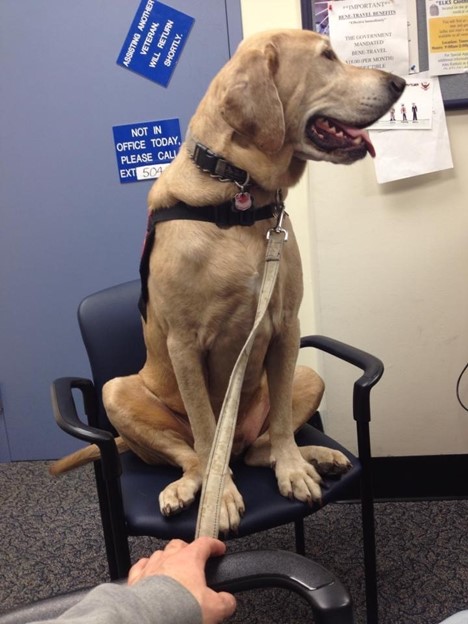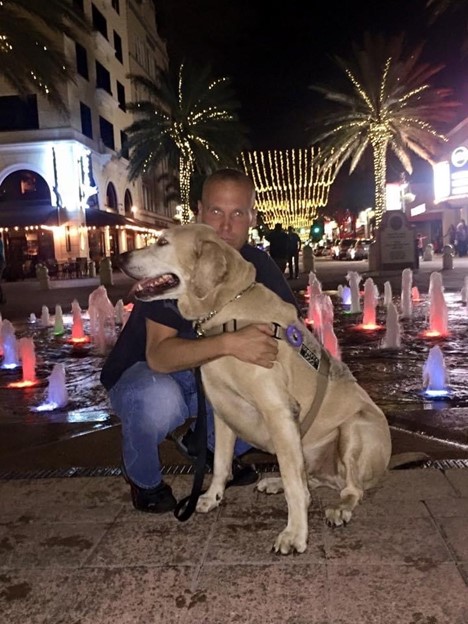Jarrett Otto Gimbl is a Marine veteran who has found solace and support within his service dog, Gunny. In the following article, Jarrett Gimbl delves into the profound bond between veterans and their faithful canine partners.
For many veterans, the transition from military service to civilian life can be fraught with challenges, particularly when it comes to mental health. Post-Traumatic Stress Disorder (PTSD), depression, and anxiety are common among military personnel, often requiring comprehensive and multifaceted treatment approaches. One increasingly recognized and effective component of mental health recovery for veterans is the use of service dogs. These specially trained animals provide not only companionship but also critical support that can significantly improve the quality of life for veterans struggling with mental health issues.
Jarrett Otto Gimbl Discusses the Role of Service Dogs in Mental Health Recovery
Service dogs are more than just pets; they are highly trained to assist individuals with specific needs. For veterans, these needs often encompass both emotional and physical support. Service dogs can be trained to perform a variety of tasks that directly address the symptoms of PTSD and other mental health conditions. Jarrett Otto Gimbl explains that many of these tasks include:
- Interrupting Anxiety Episodes: Service dogs can recognize signs of anxiety and use techniques such as nudging, licking, or providing physical pressure to help calm their handler.
- Nightmare Interruption: Many veterans suffer from nightmares as a symptom of PTSD. Service dogs can be trained to wake their handler from a nightmare, helping to reduce the duration and impact of these distressing experiences.
- Crowd Control: In public spaces, veterans with PTSD may feel overwhelmed by crowds. Service dogs can create a physical barrier between their handler and others, providing a sense of security and helping to reduce anxiety.
- Medication Reminders: Some service dogs are trained to remind their handler to take medication at prescribed times, ensuring that the veteran maintains their treatment regimen.
 The Psychological Benefits of Service Dogs
The Psychological Benefits of Service Dogs
Jarrett Otto Gimbl explains that the presence of a service dog can have profound psychological benefits for veterans. The bond between a handler and their service animal can foster a sense of purpose and responsibility, which is crucial for individuals recovering from mental health challenges. This bond can also lead to the following benefits:
- Reduced Feelings of Isolation: Service dogs provide constant companionship, which can help alleviate feelings of loneliness and isolation that many veterans experience.
- Increased Social Interaction: Having a service dog can encourage veterans to venture outside more frequently and engage in social activities, thereby improving their social skills and reducing social anxiety.
- Enhanced Mood: Interacting with a service dog can trigger the release of oxytocin, a hormone associated with bonding and happiness, leading to improved mood and emotional well-being.
The Training Process
Training a service dog to assist individuals with mental health issues is a rigorous and specialized process. Jarrett Otto Gimbl notes that various organizations that provide service dogs for veterans typically follow these steps:
- Selection: Potential service dogs are carefully selected based on their temperament, health, and ability to learn and perform specific tasks.
- Basic Training: Dogs undergo basic obedience training to ensure they can follow commands and behave appropriately in various settings.
- Specialized Training: The dogs are then trained in specific tasks tailored to the needs of veterans with PTSD or other mental health conditions. This training can take several months to complete.
- Matching: Once the dog is fully trained, they are matched with a veteran based on compatibility and specific needs.
- Handler Training: The veteran undergoes training to learn how to work with their service dog effectively, ensuring they can utilize the dog’s skills to their full potential.
Success Stories
Jarrett Otto Gimbl explains that there are numerous success stories that highlight the transformative impact of service dogs on veterans’ lives. For instance, a military veteran suffering from severe PTSD might find it difficult to leave their home due to overwhelming anxiety. With the support of a service dog, they can gradually reengage with the outside world, attend social events, and even pursue employment opportunities. These success stories are testament to the critical role service dogs play in the mental health recovery process for veterans.
Conclusion
Service dogs are invaluable partners in the mental health recovery journey of many veterans. Their ability to perform specific tasks, coupled with the emotional support they provide, can significantly enhance the quality of life for those struggling with PTSD and other mental health conditions. Jarrett Otto Gimbl says that as awareness of the benefits of service dogs continues to grow, it is essential to support programs that train and provide these remarkable animals to veterans in need. By doing so, we not only honor the service and sacrifice of our veterans but also offer them a path to healing and hope.












